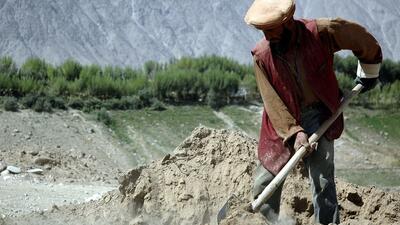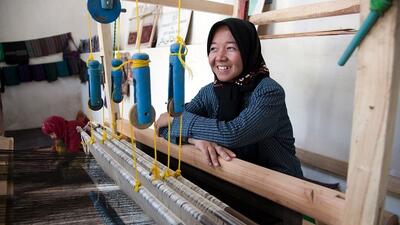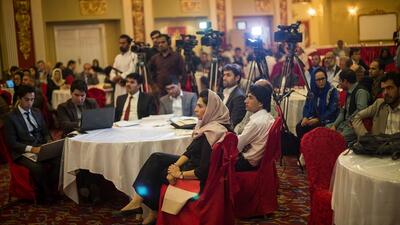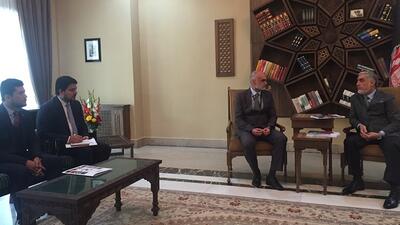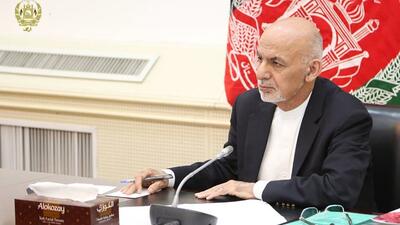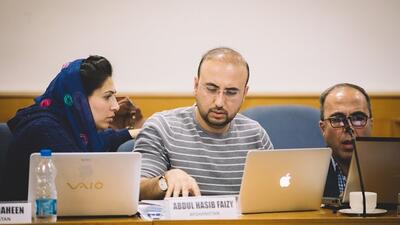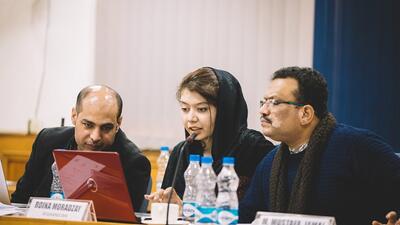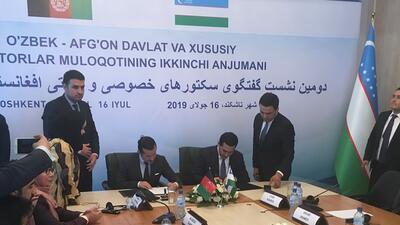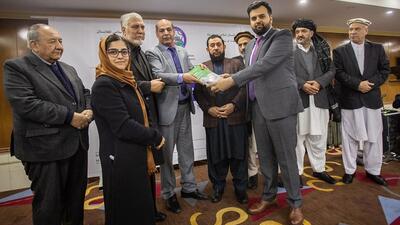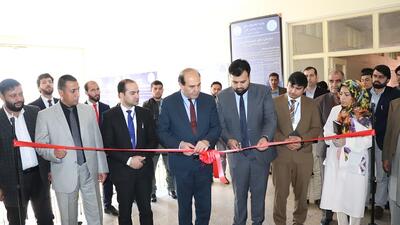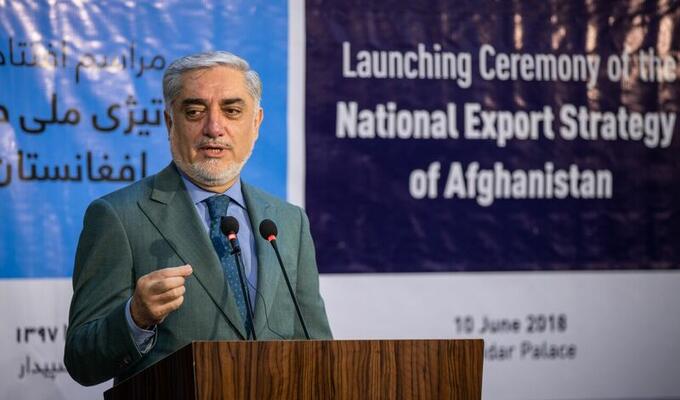
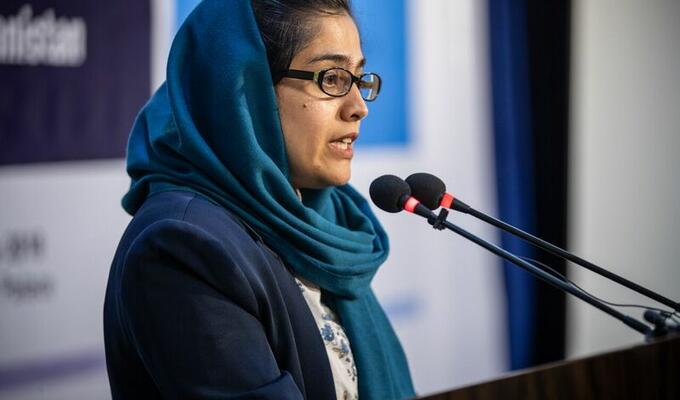
Afghanistan launches National Export Strategy (en)
Tenth June 2018 marks a milestone event for Afghanistan's economy. The launch of the National Export Strategy (NES). A result of an extensive cooperation between the Afghan stakeholders, together with their partners from the international community, the NES shall embark Afghanistan towards a largely increased export base. This means bigger self-reliance for the country and integration of the Afghan economy with global trade.
(Kabul/Geneva) – The Government of Afghanistan yesterday (10 June) launched a new policy strategy aimed at spurring growth and job creation by boosting the export capacities of the country’s private sector and stepping up trade with regional and global markets. The National Export Strategy (NES), titled ‘Peace through Prosperity, Prosperity through Trade’ is the product of multiple rounds of consultations with businesses and other stakeholders across the country led by the Ministry of Industry and Commerce together with the Afghanistan Chamber of Commerce and Industries.
At the launch ceremony in Kabul, Chief Executive Dr. Abdullah Abdullah lauded the European Union and its implementing partner, the International Trade Centre (ITC), for the financial and technical support they provided to the development of the strategy. The NES is a central component of the Advancing Afghan Trade project, funded by the European Union and implemented by ITC in support of the Afghan Ministry of Industry and Commerce.
The NES is designed to function as a compass for Afghanistan’s government; private sector and development partners in their joint efforts to help the country’s micro, small and medium-sized enterprises (MSMEs) lift their competitiveness and increase their export potential. It will guide Afghanistan's efforts to improve the business environment and use trade to generate sustainable employment opportunities and sustainable growth.
The NES identifies six priority sectors with high potential for export growth, employment generation and innovation: dried fruits and nuts; fresh fruits and vegetables; saffron; marble and granite; carpets; and precious stones/jewellery. For each of the six, it sets out policy reforms and institutional investments to tackle bottlenecks that are currently preventing Afghan MSMEs from realizing their full export potential.
The strategy also targets six cross-sector functions for improvement: trade facilitation; quality management; skills development; professional business and services, access to finance, and trade information and promotion. This is to ensure that all sectors, not just the six priority ones, see a boost in trade competitiveness.
Announcing the strategy Afghanistan’s Chief Executive, Abdullah Abdullah said: "The NES comes at an opportune time as Afghanistan seeks to boost economic growth and strengthen the productive base of its economy. Improving the country’s export performance will be crucial to driving wider and more sustainable economic growth." He further stated that the government of Afghanistan is committed to implement the recommendations detailed in the NES documents as an engine for job and wealth creation for Afghans.
"The NES fits perfectly with Afghanistan's development objectives of the transformation decade (2015-24). The EU, which opens its single market of 500 million consumers to Afghan products "duty free and quota free", is proud to be associated to this initiative. Now that the NES is officially launched, it needs to be fully appropriated by the whole Afghan business community, including those segments of the private sector which are primarily import-driven. I hope the strategy will encourage a growing number of Afghan entrepreneurs to consider exports as an integral part of their business model." said the European Union Ambassador to Afghanistan Pierre Mayaudon.
"This National Export Strategy is a home-grown blueprint for Afghan export development and business competitiveness. Today’s launch is the culmination of a year-long process with Afghanistan’s public and private sectors, but the real challenge lies ahead: implementing the strategy’s recommendations to turn this country’s export potential into jobs and inclusive growth for Afghans" said ITC Executive Director Arancha González
Welcoming the strategy Minister of Industry and Commerce, Humayoon Rasaw: said “The NES is an important policy tool for the government working in partnership with the private sector to enhance the performance of Afghanistan exports. It will contribute to the sustainable development of the Afghanistan economy and strengthen it to meet the challenges of the global economy as well as assisting in the reduction of unemployment and poverty in Afghanistan."
During the year-long consultative process that shaped the content of the NES, over 500 Afghan industry leaders, small business owners and public sector officials provided inputs on how they viewed Afghanistan’s trade and competitiveness challenges. The NES was endorsed in April by Afghanistan’s High Economic Council, following earlier approvals by the Council of Ministers and the Executive Committee on Private Sector Development (PRISEC).
To learn more about Afghanistan’s journey towards developing a NES watch the film ‘Peace through Prosperity, Prosperity through Trade’.
ITC's support for the Government of Afghanistan is aligned with the 'One UN' approach for the country, which is coordinated by the United Nations Assistance Mission in Afghanistan. The One UN approach through UNAMA ensures greater leverage of the support provided by UN agencies to the people and government of Afghanistan in achieving peace and stability, in line with the rights and obligations enshrined in the Afghan constitution.
Notes for the Editor
The EU-funded Advancing Afghan Trade project is implemented by ITC under the leadership of the Afghan Ministry of Industry and Commerce. It is a response to the Afghan government’s ongoing efforts to use trade as a driver of economic growth, regional cooperation and stability.
Afghanistan acceded to the World Trade Organization in July 2016, after which it immediately moved to ratify the global trade body’s Trade Facilitation Agreement.
To ensure sustainability, local ownership and long-term impact of the project, ITC will be working with a range of partners from the private sector, academia and civil society organizations based in Afghanistan.
For more information about the Advancing Afghan Trade project, please visit: www.intracen.org/AAT/
About ITC
The International Trade Centre is the joint agency of the World Trade Organization and the United Nations. ITC assists micro, small and medium-sized enterprises in developing and transition economies to become more competitive in global markets, thereby contributing to sustainable economic development within the frameworks of the Aid-for-Trade agenda and the United Nations’ Sustainable Development Goals.
For more information, visit www.intracen.org | twitter.com/ITCnews | facebook.com/InternationalTradeCentre | linkedin.com/company/international-trade-centre
Please click here to read the press relase in Dari.
For more information, please contact:
International Trade Centre
Jarle Hetland
Media Officer
Office of the Executive Director
P: + 41 22 730 0145
M: + 41 79 582 9180
E: hetland [at] intracen.org (hetland[at]intracen[dot]org)
European Union Delegation in Afghanistan
Abdullah Yadgare
EU Media Adviser
M: +93 (0) 700 17 35 48
E: abdullah.yadgare [at] eeas.europa.eu (abdullah[dot]yadgare[at]eeas[dot]europa[dot]eu)




